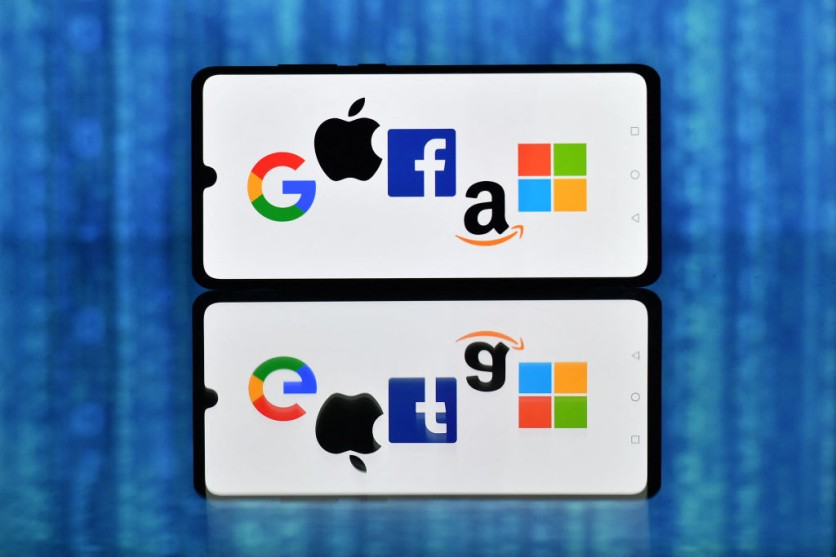In a significant collaborative effort, leading technology companies have come together to address the deceptive use of artificial intelligence in the forthcoming global elections.

An illustration picture taken in London on December 18, 2020 shows the logos of Google, Apple, Facebook, Amazon and Microsoft displayed on a mobile phone.
Addressing Deceptive Use of AI During Elections
"Tech Accord to Combat Deceptive Use of AI in 2024 Elections" was unveiled at the Munich Security Conference. Notable participants in this accord include Adobe, Google, Microsoft, OpenAI, Snap Inc., and Meta, among others.
The accord involves 20 major players pledging to utilize advanced technology to detect and counter harmful AI-generated content designed to mislead voters. Outlined within the agreement are eight specific commitments aimed at combating deceptive AI-generated content related to elections.
These commitments extend to AI-generated audio, video, and images that alter the appearance, voice, or actions of political candidates and other prominent figures, disseminating false information about voting logistics.
This collaboration underscores the industry's recognition of the importance of addressing the misuse of AI technology in the electoral process and its commitment to safeguarding the integrity of elections worldwide, as reported by Interesting Engineering.
Also Read : Fake Biden 'Pedophile' Video on Facebook Now Considered Malicious, Meta Oversight Board Rules
Ambassador Dr. Christoph Heusgen emphasized the accord's significance by stating that elections are the beating heart of democracies. He underscored the importance of the Tech Accord as a pivotal measure in advancing election integrity, bolstering societal resilience, and fostering trustworthy tech practices.
Despite the commendable advancements in AI technology, the proliferation of "deepfakes," AI-generated content that convincingly manipulates visuals and audio, poses a significant threat. This threat underscores the urgent need for collective action to safeguard the democratic process.
Safeguarding Elections
In recent months, residents of New Hampshire found themselves targeted by deceptive robocalls purporting to be from President Joe Biden. These calls urged constituents to abstain from voting in the presidential primary and instead instructed them to cast their votes directly in the November general election.
In an extensive blog entry, Vice Chair and President of Microsoft Brad Smith, underscored a multifaceted strategy to confront the threats posed by deepfakes in the upcoming 2024 elections. Smith outlined three fundamental pillars underlying the commitments of the accord.
Primarily, the accord endeavors to heighten the challenge for malicious actors seeking to exploit legitimate tools for generating deepfakes. This involves fortifying the security framework within AI services, conducting risk assessments, and implementing safeguards to forestall misuse.
The second pillar entails collaborative efforts to detect and address deepfakes in elections. Microsoft will utilize its AI for Good Lab and Threat Analysis Center to enhance detection capabilities. Additionally, a new web page will enable political candidates worldwide to report deepfake concerns.
The final pillar underscores the importance of transparency and societal resilience. Microsoft commits to publishing an annual transparency report, engaging with global civil society organizations and academics, and supporting public awareness campaigns.
While the Tech Accord is a significant step forward, Smith emphasized that safeguarding electoral integrity requires shared responsibility across borders and political affiliations.
Read also: POTUS Biden Robocall: New Hampshire Voters Advised Not to Vote, Attorney General Says It's Fake

ⓒ 2026 TECHTIMES.com All rights reserved. Do not reproduce without permission.




